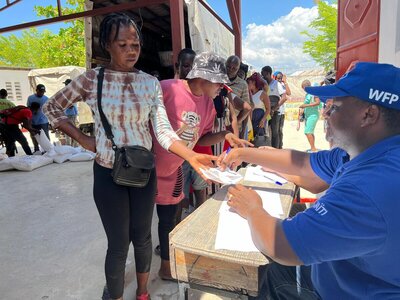Emergency
Haiti
- 5.7 million
- facing acute hunger
- 2.2 million
- people reached by WFP in 2025
- US$44 million
- needed for WFP operations up to April 2026
Haiti is among countries struck by Hurricane Melissa after it left devastation across the Caribbean in late October and early November 2025.
Homes and infrastructure have been washed away along the southern coast, which was the most impacted. In total, almost 6 million people across Haiti, Jamaica and Cuba have been affected.
The World Food Programme (WFP) had reached 12,700 people with emergency food distributions across grand southern regions by early November, and was scaling up to reach 190,000 people, as part of the response.
Prior to the disaster, Haiti was already among the top five hunger hotspots globally.
The capital Port-au-Prince is increasingly isolated and families are being pushed down a pathway to famine, as violence related to armed groups escalates and limits humanitarian access. Reports indicate that armed groups now control nearly 90 percent of the capital.
A total of 5.7 million people – over half the population – are food insecure, with 1.9 million at emergency levels of hunger.
Raging violence by armed groups has contributed to the displacement of 1.4 million people, with many families living in schools and public buildings without income or education. More than half of the displaced are children, contributing to high rates of child malnutrition.
Economic collapse and disrupted food production are compounding the crisis.
WFP has reached a record 2.2 million Haitians in 2025, despite deteriorating security and growing resourcing challenges, and has managed to pull thousands of people back from the brink of famine.
Haiti is the most underfunded crisis in the world. Funding shortfalls are threatening emergency assistance as well as projects promoting long-term food security.
WFP has been forced to suspend life-saving meals for newly displaced families and slash rations in half as funding shortfalls impact vulnerable families. However, in areas controlled by armed groups, WFP has been able to launch resilience projects to restore irrigation and boost local food production.
At the same time, humanitarian organizations continue to face challenges in accessing communities living in areas controlled by armed groups.
WFP requires US$44 million for operations up to April 2026.
What the World Food Programme is doing to respond to the Haiti emergency
-
Hurricane Melissa
-
Anticipatory payments worth US$900,000 were provided to 50,000 people to protect their livelihoods ahead of the hurricane. Some 2.5 million people also received text messages with practical guidance on how to prepare for and stay safe during the storm. Families leaving temporary shelters to return home have received a two-week food ration, followed by one month of cash assistance to help them buy essentials where markets remain functional and to support stronger recovery. WFP has reached 12,700 people with emergency food distributions across grand southern regions and is scaling up to reach 190,000 people as part of the response.
-
Emergency assistance
-
Emergency preparedness
-
UNHAS
-
Resilience building

